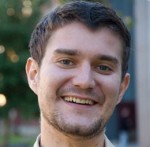People
Silvia Santini
Professor
Silvia Santini is an Associate Professor at the Faculty of Informatics of USI since September 2016. From July 2014 until August 2016, Silvia held an Associate Professor position at TU Dresden, where she led the Embedded Systems Lab. From October 2011 until July 2014 she was an Assistant Professor at the Department of Electrical Engineering and Information Technology of TU Darmstadt, Germany, where she led the Wireless Sensor Networks Lab.
Marc Langheinrich
Professor
Marc is a full professor in the Faculty of Informatics. His main interests are privacy and security, and the role usability play in this respect. Marc received a masters degree (Diplom) in computer science from the University of Bielefeld, Germany, in 1997, and his PhD (Dr. sc.) from the ETH Zurich, Switzerland, in 2005.
Researchers

Martin Gjoreski
Postdoc
Martin is an Ambizione Fellow funded by the Swiss National Science Foundation (SNSF) and hold the position of Scientific Collaborator at the People-Centered Computing Lab. His primary research focus is on Artificial Intelligence (AI), specifically in the areas of machine learning, federated learning, and explainable AI (XAI). He applies these concepts to various domains such as wearable computing, affective computing, and digital healthcare.

Kacper Sokol
Postdoc
I'm a postdoctoral researcher at the Faculty of Informatics, Università della Svizzera italiana (USI), affiliated with the People-Centered Computing Lab. My research primarily focuses on the explainability of data-driven predictive systems based on artificial intelligence and machine learning algorithms. I am especially interested in exploring their applications within the medical field.

Francesco Sovrano
Postdoc
Francesco Sovrano is a computer scientist and data science researcher focused on explainability for responsible AI. He earned a PhD in Data Science and Computation in 2023 from the University of Bologna, in association with the Polytechnic University of Milan, developing a computational theory of explanations with applications in user interfaces, regulatory compliance, and reinforcement learning. As a Postdoctoral Researcher at the University of Zurich, he applied explanation theories to software engineering, AI in education, and EU regulation, while also researching machine learning for code. He later became an Early-Career Fellow at ETH Zurich’s Collegium Helveticum, creating XAI tools to reveal rules and biases in LLM-generated explanations. His work aims to identify and mitigate cognitive and statistical biases in human-AI interaction, advancing transparent, ethical, and trustworthy AI.

Shivalika Goyal
PhD Student
Shivalika is an Engineering PhD candidate in AcSIR-RMIT Cotutelle Program, specialising in Computer Vision with a focus on the optimization of gaze estimation algorithms for robust real-world deployment. She is currently hosted as a visiting researcher at USI Lugano under Swiss Government Excellence Scholarship (ESKAS). She has a strong interdisciplinary background spanning assistive technologies and human-computer interaction (HCI).

Nouran Abdalazim
PhD Student
Nouran is a PhD Student at the Faculty of Informatics, Università della Svizzera italiana (USI). She is working on mobile and affective computing, with a focus on personal and work health.

Mohan Li
PhD Student
Mohan is a PhD Student at the Faculty of Informatics, Università della Svizzera italiana (USI), Switzerland. Currently, he is working on privacy-friendly technologies such as federated learning on human well-being, job-satisfaction, wearable computing and much more.

Matías Laporte
PhD Student
Matías hails from Buenos Aires, where he completed his MSc in Computer Science at the Universidad de Buenos Aires. During his studies, he worked for several years as a fullstack developer for various companies. He is now investigating how physiological signals affect memory recall.

Lidia Anna Maria Losavio
PhD Student
Lidia is a PhD Student at the Faculty of Informatics, Università della Svizzera italiana (USI). She holds a double MSc degree in Computer Science from the University of Milano-Bicocca and USI. She has a background in formal software verification and information theory. Her current research focuses on machine learning solutions for financial crime detection, including credit card fraud and money laundering.

Lidia Alecci
PhD Student
Lidia is a PhD Student at the Faculty of Informatics, Università della Svizzera italiana (USI). She is interested in wearable devices for Sleep Monitoring, Personal Health and Affective Computing.

Leonardo Alchieri
PhD Student
Leonardo is a PhD Student at the Faculty of Informatics, Università della Svizzera italiana (USI). He is interested in machine learning applied to Wearable, Affective and Ubiquitous Computing, especially with an aim for personal health.

Gabriele Dominici
PhD Student
Gabriele is a PhD Student at the Faculty of Informatics, Università della Svizzera italiana (USI), Switzerland. Currently, he is working on developing interpretable Machine Learning models, which are able to generate counterfactuals, with the aim to improve the interaction between machine and humans.

Francesco Bombassei De Bona
PhD Student
I am a PhD Student at the Faculty of Informatics, Università della Svizzera Italiana (USI), Switzerland. My research aims to create multimodal and interactive explainable AI tools for Machine Learning models using wearable sensor data, develop privacy-aware ML techniques, and integrate both aspects into a unified approach.

Dario Fenoglio
PhD Student
Dario Fenoglio is a PhD Student at the Faculty of Informatics, Università della Svizzera italiana (USI). He specializes in developing explainable machine learning and deep learning methods in healthcare, with a focus on data privacy.

Daniil Kirilenko
PhD Student
Daniil is a PhD student in informatics at the Faculty of Informatics, Università della Svizzera italiana (USI). His current research is situated in the Explainable AI (XAI) domain, with a particular focus on generating factual explanations for multimodal, high-dimensional, and time series data.













